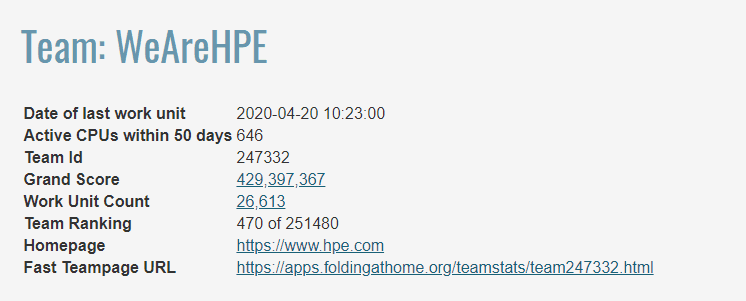
Scientists around the world are racing to determine how to defeat COVID-19. Technology companies, like Hewlett Packard Enterprise (HPE), are in a unique position to assist. As a company whose purpose is to advance the way people live and work, HPE is proud that its technology and its employees’ expertise are being called into action to help organizations address the COVID-19 crisis. Here are four ways that HPE’s technology and talent are on the front lines in the fight against COVID-19, and how you can help.
Key member of the COVID-19 High Performance Computing Consortium
Given enough compute power, scientists can accelerate finding a resolution to the COVID-19 pandemic. Computing resources help researchers collect, process, and analyze the massive amounts of data required to understand and model the virus’ genetic coding. Epidemiological data scientists rely on supercomputing processing to help them understand disease conditions and distribution patterns within the population. This data is essential to identify risk factors and determine health-related policies.
As part of the COVID-19 High Performance Computing Consortium, HPE joins other key industry, government, and academic partners in providing COVID-19 researchers with access to the world’s most powerful high-performance computing resources. One way consortium members are helping is by offering those with approved COVID-19 related research proposals free access to technology resources required to find a cure for the virus. More specifics can be found in the White House Announces New Partnership to Unleash U.S. Supercomputing Resources to Fight COVID-19 article.
HPE AI/ML projects could lead to quicker cures overall
With the acquisition of supercomputing leader, Cray Inc., HPE added powerful computing resources to its arsenal. HPE DEV community member, Sreenivas Rangan Sukumar, explains that the HPE artificial intelligence (AI) / machine learning (ML) team currently has several projects in the works helping scientists find treatments. Three projects, in particular, may set the basis for an end-to-end pipeline by which cures for numerous diseases can be found more quickly than ever before.
The first project, PharML.Bind, is an AI-driven approach that screens databases of potential drug compounds. It works by feeding supercomputer-based simulations of molecular dynamics (docking) to validate chemicals as potential targets for a vaccine or drug. Current bio-physical molecular docking is expensive and takes several hours in simulation testing for each potential chemical, which slows results. In contrast, PharML.Bind is computationally affordable and significantly faster in predicting the binding potential for a chemical to a target virus protein.
Another project addresses the treatment phase of the COVID-19 pandemic. This project focuses on using AI to augment human researchers in validating a screen by connecting-the-dots across literature and curated-databases (such as Biosamples, Uniprot, Clinical Trials, DrugBank, PubChem etc.). The project uses the Cray Graph Engine, the world’s fastest graph database, to host, query, and reason with a knowledgebase of 100+ billion facts in a few seconds – something that otherwise would have taken months. Now using a supercomputer, researchers have access to this integrated body of knowledge – all in one place.
Finally, several HPE engineers and developers are working on the White House COVID-19 “Kaggle” Challenge. This urgent call-to-action is asking the world’s AI experts for assistance in answering key scientific questions related to COVID-19. These questions include: “What is known about transmission, incubation, and environmental stability?”, “What do we know about COVID-19 risk factors?”, and “What worked and what didn’t?”
While each of these COVID-19 specific AI/ML efforts will provide significant contributions to the community individually, the combined use of these projects can assist healthcare efforts far beyond this immediate crisis. As Sreenivas Rangan Sukumar points out, accelerated chemical-structure discovery and literature-based evidence discovery means faster cures for many other illnesses.
The Folding@Home effort
In addition to HPE offering corporate resources, HPE employees are personally doing what they can to help. Numerous engineers and developers are volunteering CPU time from their home computers as part of a distributed computing project called Folding@Home. An open source project initially focused on fighting different types of cancer and neurological diseases, Folding@Home now has a major focus on COVID-19.
Greg Bowman, PhD, an assistant professor of biochemistry and molecular biophysics at Washington University School of Medicine in St. Louis, leads this open source activity. The goal is to simulate the dynamics of COVID-19 proteins in the hunt for new therapeutic opportunities. By unravelling the mysteries of protein dynamics, including the folding process, Dr. Bowman hopes to better understand how viral proteins work and design therapies to stop the coronavirus.
As pointed out in HPE DEV member Michael Mattsson’s blog, a couple of HPE community teams are already actively supporting Folding@Home within HPE: HPE DEV (246814) and WeAreHPE (247332). The worldwide response to this effort has been tremendous. Folding@Home recently clocked 470 PFLOPs of compute power, which is more than two times higher than the peak performance of ORNL's Summit, the world's most powerful supercomputer. In just over a month, the WeAreHPE team placed in the top 500 in terms of work unit count, ranking 470 out of 251,480.

Networking with HPE Aruba and Airheads volunteers
In addition to compute power, network infrastructure and the skills required to set it up are also needed to address this crisis. Many hospitals are struggling to handle the patient load and are building temporary COVID-related healthcare facilities.
To help healthcare organizations set up quickly, Aruba created the Airheads Volunteer Corps, an opt-in registry of volunteer network engineers ready to assist in the build out of networks for medical facilities battling this pandemic. In creating this registry, Aruba connects those in need of IT assistance, with those who have the ability to help. HPE is also supporting this effort by donating thousands of secure connectivity kits. Learn more here.
From Genoa, Italy, Aruba’s Stefano Brioschi shared how he and Chiara Cipollini, HPE account manager for the Italian cruise market, volunteered time and equipment to build a Wi-Fi network on a passenger vessel. The Grandi Navi Veloci (GNV) Splendid, was being turned into a fully-equipped hospital ship, but the ship’s iron construction prevented adequate mobile connectivity. The two connected with local partner, Mantero Sistemi, to deploy a wireless infrastructure to support communications between ambulance crews, doctors, medical devices, the ship’s crew, and patients.

In only 5 days and working with a team of 10 people, they were able to create a network composed of 70 access points, 10 switches, and over 4 kilometers of UTP cable. Through this effort, they provided Wi-Fi coverage across the various decks of the ship, helping to form a controlled facility where patients could recover before returning to their homes.
Join the effort
The HPE DEV team supports many of these efforts. Interested in volunteering your expertise to help find a cure? Register to our Slack workspace and join us on the #hpedev-volunteers channel to learn more about how you can join the HPE DEV Folding@home team (TeamID: 246814). If you’re interested in participating in the Aruba Airheads opt-in registry, you can volunteer here.
Tags
Related

10 Myths About Scalable Parallel Programming Languages (Redux), Part 1: Productivity and Performance
Apr 30, 2025
10 Myths About Scalable Parallel Programming Languages (Redux), Part 2: Past Failures and Future Attempts
Jun 2, 2025
10 Myths About Scalable Parallel Programming Languages (Redux), Part 3: New Languages vs. Language Extensions
Jun 26, 2025
10 Myths About Scalable Parallel Programming Languages (Redux), Part 4: Syntax Matters
Jul 23, 2025
10 Myths About Scalable Parallel Programming Languages (Redux), Part 7: Minimalist Language Designs
Oct 15, 2025
10 Myths About Scalable Parallel Programming Languages (Redux), Part 6: Performance of Higher-Level Languages
Sep 18, 2025
10 Myths About Scalable Parallel Programming Languages (Redux), Part 5: Productivity and Magic Compilers
Aug 21, 2025
